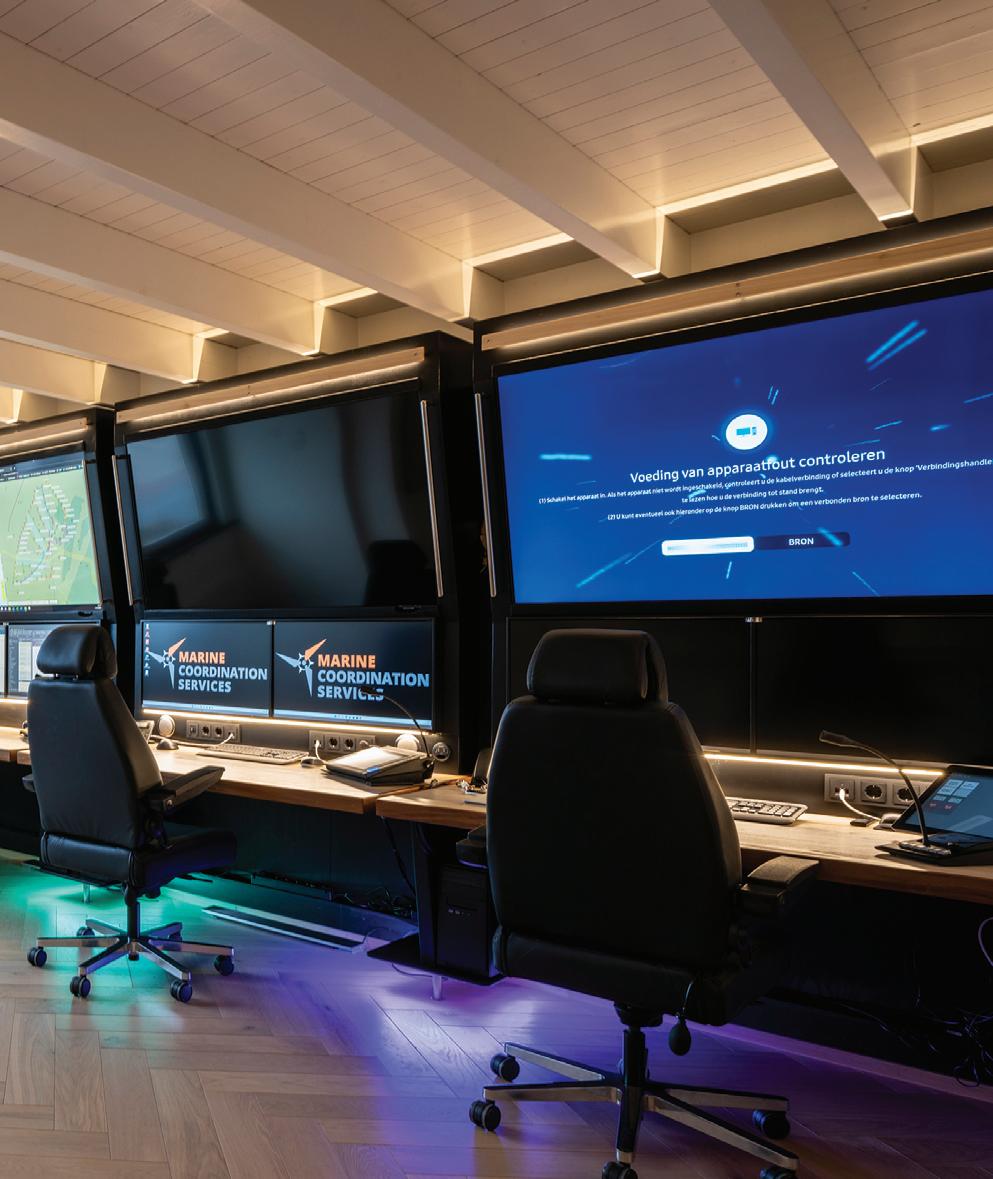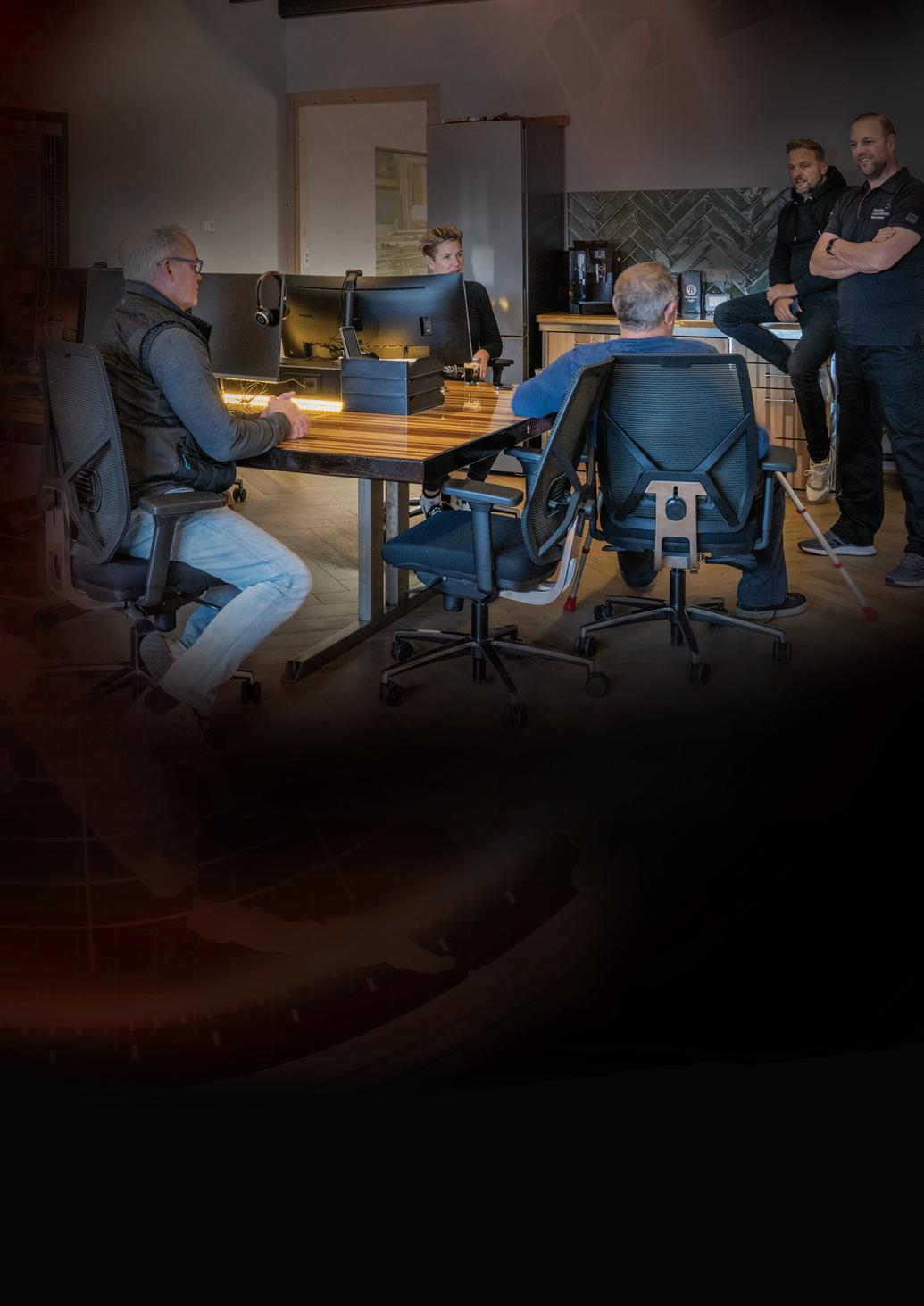


Marine Coordination Services (MCS) offers the preparation and organisation of marine coordination centres for offshore projects. The company covers all the relevant arrangements such as port logistics and the storage of equipment from a dedicated marine base. Jens Doeksen, Managing Owner, explained to Hannah Barnett how the company is growing.
Playing it safe does not come naturally to Marine Coordination Services, nor to its Managing Owner, Jens Doeksen.
“What we’re trying to do is anticipate trends,” he said. “There is a lot of talk in this market, but we have got to act now, and that takes entrepreneurial spirit. But
we are a hands-on operation and like a challenge: that’s where we can set ourselves apart from others.”
The main scope of the company’s work involves providing support for offshore projects. This includes 24/7 monitoring and coordination of vessel traffic, people-tracking, field communication

and provision of relevant equipment. Furthermore, MCS also offers projectstaffing, vessel inspections, helicopter operations and HSE consultancy as services.
The creation of the company’s innovative marine coordination centre is one of the most significant ways MCS is developing new business methods. Operating a remote-control centre from its base in the Netherlands, (instead of sending employees to set up base ports nearer projects), is a divergence from the traditional way offshore projects are run.

“From our centre we can tap into multiple wind farms at the same time,” said Mr Doeksen, “because we have three workspaces. Currently, we’re working on the Hollandse Kust Noord project. It’s an interesting challenge because we are developing our remote operations. Normally, these are performed in a base port, but things are changing.”
A history of operations
Mr Doeksen met his business partner and co-Managing Owner of MCS, Cor van der Velde, in 2015. Both were working on the Gemini windfarm project, Mr Doeksen as a Marine Coordination Supervisor and Mr van der Velde as a Crew Logistics Manager.
“We knew the offshore market was expanding,” Mr Doeksen recalled. “And we decided to take the plunge and do it, combining both our backgrounds. We knew what we had would work for the industry, because there's a lot of logistics involved, as well as the other side of it, the marine coordination – which I was
doing. We saw the gap in the market. There were only a couple of competitors at that time, one of which was in the UK, but nothing was available in the Netherlands.”
Mr Doeksen is realistic about the contacts required to start a business of this sort; to form the necessary partnerships and to make them profitable. “Obviously, it’s not that easy to enter the market at first,” he said. “It’s not like having a company painting houses. In this industry you’ve got to have your entrance and that first kick-off and then build up a track record.
“We set up the marine coordination centre but didn't know if we would get any projects. But I think risk-taking is so important in this field. Everybody’s talking about making difficult choices, but not doing them. That means things don’t change.”
The company now boasts 35 employees, monitoring everything from marine coordination to back-office operations, finance, administration and more. The marine coordination centre ensures a centralised and real-time overview of all the activities during an offshore

“FOR INDUSTRIES FOCUSED ON SUSTAINABLE TECHNOLOGIES, LIKE OFFSHORE WIND, THERE IS ALSO A CONTINUAL NEED FOR COST REDUCTION SINCE THE GOAL IS A SUSTAINABLE FUTURE”

project’s construction phase. It is applicable to any scope of work, such as pre-installation, dredging activities, installation of scour protection foundations, WTG cable laying and day-to-day processes during the Operations and Maintenance phase.
“If we get an invitation to tender, first we need to establish the communication infrastructure, how to build it, set it up and deliver the hardware,” Mr Doeksen explained. “Secondly, we need to deliver the software tool for vessel and people tracking or find one on the market. And the third service we offer is finding the quality and experienced Marine Coordinators to be involved.”
Investment in workforce
As much of the operations at MCS focus on personnel introductions and vessel tracking, multiple communication streams and transfer plans between the different parties involved are necessary. It is work that requires highly trained staff but, according to Mr Doeksen, the

relative newness of the market can make that a challenge.
“At the moment, the business is growing because more wind farms are being built,” he said. “But the market is still young, in the Netherlands and other countries and there’s not a lot of expertise. So, there can be demand, but not enough workforce. For instance, in the Marine Corps field there are a lot of experienced guys, but as the market is growing we don’t always get them. We can train others, but that jeopardises quality.”
The company is, however, focused on establishing its own stability as a business to win long-term clients, thereby delivering consistency and cost efficiency to regular partners. This also involves investment in a broader workforce.
“We need to start training to expand the workforce,” said Mr Doeksen, “even before we have a project awarded we must take that step. And we need one or two extra locations. We are looking to expand further, setting up offices at potential sites elsewhere in Europe.”
Sustainable futures
During the construction phase of an offshore windfarm, there are multiple subcontractors involved and therefore an increased demand for efficient communication and safety awareness. For industries focused on sustainable technologies, like offshore wind, there is also a continual need for cost reduction since the goal is a sustainable future.
Mr Doeksen is confident that MCS offers the ideal solution. “The way we operate is more sustainable than traditional methods,” he explained. “The old way is to set up in base port, meaning everybody flies in; you have to organise hotels and that sort of thing. But in this case, the guys are sitting in that same location for each project, so there is a lot less travelling.”
The company is working closely with some significant partners, like leading marine surveyors AMA, marine services

DHSS and communication specialists Abiom, to fully establish MCS’ presence and sustain its growth.
Mr Doeksen concluded by stressing the importance of close working relationships with all of MCS’ partners. While these connections may begin formally, they soon become friendly partnerships to ensure efficient operations for the benefit of both parties. n



